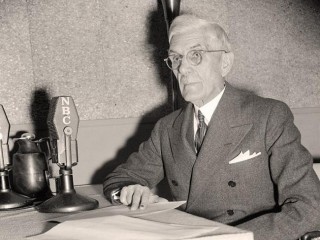
Francis Townsend biography
Date of birth : 1867-01-13
Date of death : 1960-09-01
Birthplace : Fairbury, Illinois
Nationality : American
Category : Science and Technology
Last modified : 2011-05-10
Credited as : Physician, and author, old-age pension proposal during the Great Depression
Francis Everitt Townsend was an American physician, author, and political organizer, crusaded for pensions for the elderly.
Francis Townsend was born into a poor farm family near Fairbury, II., on Jan. 13, 1867. The family moved to Nebraska, where Francis attended Franklin Academy. He went to California expecting to get rich in the land boom, only to end up nearly penniless. After a few years at farming and odd jobs in Kansas and Colorado, Townsend entered Omaha Medical College, graduating in 1907. He set up practice in South Dakota, where he remained until he entered the Army Medical Corps in World War I. He married a nurse, Minnie Bogue.
After the war the Townsend's lived in Long Beach, Calif. But Townsend's medical practice was far from prosperous. He finally secured appointment as assistant city health director but, with the Great Depression, lost the job. At retirement age himself, Townsend grew increasingly indignant over the plight of the masses of poverty-stricken old people. In 1933 he proposed a plan whereby the Federal government would provide every person over 60 a $200 monthly pension. This would be financed by a Federal tax on commercial transactions.
The response to Townsend's Old Age Revolving Pension Plan was overwhelming, and soon inquiries and monetary contributions poured in from all parts of the country. By 1935 Townsend claimed that more than 5, 000 "Townsend Clubs, " with some 5 million members, operated across the country. That year the Townsend organization secured an astounding 20 million signatures on petitions urging Congress to enact the Townsend Plan. Organized pressure from the Townsendites was the single most powerful impetus behind passage of the Social Security Act of 1935. Yet Townsend saw the social security program as woefully inadequate.
Disillusioned with Franklin Roosevelt's administration and embittered by rough handling before a congressional investigating committee, Townsend in 1936 joined forces with Father Charles Coughlin, founder of the National Union for Social Justice, and Gerald L. K. Smith, self-pro-claimed inheritor of the late Huey Long's "Share Our Wealth" movement, to form the Union party. But the result of that year's presidential election was disastrous for them, as Roosevelt won reelection by a record majority.
In 1937 the U.S. Department of Justice prosecuted Townsend for contempt of Congress in the 1936 House investigation. However, Roosevelt commuted Townsend's 30-day prison sentence.
Townsend never stopped pushing his pension scheme. But the prosperity of the post-World War II years and improvements in private, state, and Federal pension benefits blunted the appeal of his message. He died in Los Angeles on Sept. 1, 1960.
















